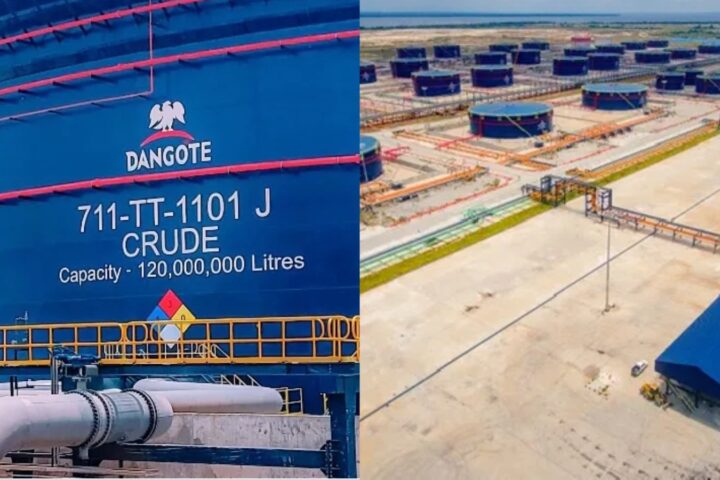Dr. Muda Yusuf is the immediate past Director-General, Lagos Chamber of Commerce and Industry. In this interview with Prime Business Africa, he talks about his time at the LCCI and other issues affecting the economy
Join our WhatsApp Channel
How did you rise to the top at the LCCI?
THE journey to the top as the Director General of the Lagos Chamber of Commerce and Industry [LCCI] was first and foremost a manifestation of the grace of God. It was also partly a result of my unwavering commitment, hard work and diligence in the discharge of my responsibilities at every turn of my career in the LCCI.
I have also been lucky to work with understanding, cooperative and supportive Directors General [Mr Adekunle Olumide and Late Sir Remi Omotoso], presidents and council members over the period.
I must acknowledge the amazing contributions and support of my colleagues in the secretariat which brought team effectiveness to bear on our activities and outcomes.
We collectively ensured that corporate objectives of the chamber were achieved in the core areas of policy advocacy, business development services, staging of the Lagos International Trade Fair, staging of specialised exhibition, promoting international trade missions, investment relations and connectivity, promoting quality networking among members of the chamber. It is not just about me; it is about the entire team. We give God the glory.
Where do you go from here?
I will be transiting to self-employment in the meantime. I will also continue to be active in sharing my perspectives on contemporary economic issues and explore opportunities in the academia.
What is your most important achievement?
As a person, I am not a believer in self-appraisal but suffice it to say that I have done my best, in collaboration with my colleagues in the secretariat, to strengthen the capacity of the LCCI in its areas of core deliverables.
These include Policy Advocacy, business development services, trade, and investment promotion, and strengthening stakeholder relationships.
We deepened inclusion in line with the diverse nature of the LCCI membership, cutting across twenty-six sectors of the Nigerian economy. I also did my best to strengthen relationship and synergy with internal and external stakeholders in the public sector and the business community. Managing stakeholders is a major component of a chamber of commerce and a critical deliverable for the chief executive for that matter. But more importantly, is for posterity to judge what my contributions have been.
What is your agenda for the incoming DG?
Some advice would be more appropriate than agenda setting. Developing the chamber is work in progress. I would advise that she should sustain and improve on advancement initiatives that are ongoing. I would also expect her to bring on board new ideas that could drive innovation and deepen the value proposition of the LCCI. Strengthening the LCCI advocacy, creating new opportunities for members, and consolidation of the relationship of the LCCI with critical stakeholders in government, the diplomatic community, and the investing community.
I look forward to an acceleration of the digitization process of the chamber which is necessary to promote efficiency and effectiveness in the delivery of services to the members of the Chamber.
The chamber’s membership strength will impact on its relevance and therefore she would need to ensure that we grow membership to enhance the representative value of the LCCI to the business community. The momentum of service delivery in trade promotion, international business networking, business development services would need to sustain and improved upon.
Given the pedigree of my successor, Dr. Chinyere Almona, I am confident that she will take the LCCI to greater heights.
Could you share your perspectives on the AfCFTA and implications for Nigeria’s economy?
The Africa Continental Free Trade Agreement [AfCFTA] is an important component of the vision of the African Union to promote and drive economic integration on the continent. Currently trade within the continent account for 12% of total trade. It is expected that AfCFTA will make the continent more integrated, united, and prosperous.
The AfCFTA is a good aspiration, especially in the light of the numerous benefits of a larger market. The combined economies of the continent are estimated at $3.4 trillion and a population of about 1.4 billion people. This offers tremendous opportunities for investors in Africa. But the benefits and costs of the AfCFTA will vary from country to country, depending on their state of economic competitiveness. The trade deal will also come with some disruptions to some sectors.
The flip side, however, is that a liberal trade regime within the continent poses a key risk to the Nigeria manufacturing sector. Nigerian industrialists, especially those in the SME segment are highly vulnerable because of their weak competitiveness. Manufacturing in Nigeria is burdened by profound infrastructure challenges, foreign exchange liquidity issues, high energy cost, high cost of funds, paucity of long-term funds, costly ports processes, high transportation costs which put tremendous pressure on their production and operating costs. These factors exacerbate the vulnerability of the Nigerian manufacturing sector in a continental or global setting.
Nigeria’s industrialisation strategy, which has been in place for several years is rooted in import substitution and protectionism. This is a model of industrialisation that is inward looking and dependent largely on domestic market for its sustenance. This strategy does not position the sector for competition in the regional, continental, or global marketplace. The sector does not have an outward looking or export-oriented disposition.
While economic integration is desirable because of the attraction of larger market, we need to worry about the implications for our weak industrial sector. Meanwhile, the Nigeria service sector is relatively more competitive and would gain much more from the trade deal. Already our financial services, entertainment, fashion, distributive trade, e-commerce, ICT, and Telecoms all have strong presence in many countries on the continent.
What are your thoughts on Nigeria’s debt profile?
The growing national debt is a cause for concern as the debt profile grew from N12.6 trillion in 2015 to N33.1 trillion in March 2021, an increase of 162%. Although about 15% of these were debts owed by the state governments.
The capacity to service the current stock of debt raises serious sustainability concerns. The opportunity cost of high debt service commitment for the economy and citizens is very high. There is also the exchange rate risk inherent in the exposure to mounting foreign debt which we need to worry about. As the currency depreciates, the burden of servicing foreign debt would intensify. This is a major problem with increasing the stock of foreign debt.
All of these underscores the imperative of appropriate policy choices to attract equity domestic and foreign private sector capital for economic and social infrastructure financing. It is necessary to review the spending structure of government and the cost of governance. The ballooning recurrent expenditure, in the face of declining revenue is a cause for concern.
What advice to you have for foreign investors?
The advice I have for foreign investors is to let them know that the opportunities for investment in Nigeria are enormous, the market is big; it is the largest market on the African continent with a population of over 200 million people. It is the largest economy on the continent with a GDP of over $400 billion. All of these are pointers to the fact that there are huge opportunities for investment.
However, to be able to take advantage of these opportunities a proper understanding of the business environment is imperative. Therefore, it is important that they seek knowledge of the local environment and understand the various contexts in which businesses operate.
These contexts include, the political context, the policy context, the institutional context, the cultural context, the economic context, and the regulatory context. All of these would shape the strategy of any investor both foreign and local. Such knowledge also helps to mitigate the risk of investment.
Secondly, investing in many developing countries require a very robust appetite for risk.
The environment in Africa is not as stable as what you have in the United States, Europe, and some parts of Asia. Therefore, the appetite for risk must be high. Such risks could be political, regulatory, policy or macroeconomic in nature.
But the good news is that the returns are generally commensurate with the risk. It is advisable for investors to have local partners to moderate the risk of investing in a completely new environment.
Thirdly, for investors in production, having a backward integration mindset will be very useful. This business model will position the company to rely less on imported raw materials with all its attendant problems.
High level of backward integration also reduces the shocks of volatilities in the exchange rate and the policy shocks of the foreign exchange market. So having a good backward integration strategy is a good strategic option for investors.
Fourthly, the investor should uphold and adhere to good corporate governance and be very good corporate citizens.
This will entail the timely discharge of statutory obligations of the company such as taxation, compliance with regulations and compliance with all the rules governing business in Nigeria. Good corporate governance also entails that the investor gives due attention to the impact of the business on their environment, the welfare of employees and the interest of consumers.
Such an investor, a good investor will not just focus only on profit but focus on all the other variables that will ensure the sustainability of both the investment and the economy as a whole. These are the kind of advice I will give to a foreign investor, and indeed to domestic investors as well.
Why do you think businesses moving to Ghana, what is Ghana doing right that Nigeria is not doing?
Generally, capital will move or gravitate towards an environment that is conducive for promoting the primary objective of the investment which is good returns on investment. An investor also will appreciate an environment that is generally conducive for investment.
What often makes the difference is the kind of investment climate that a country creates such that will inspire the confidence of investors.
It is not only about relocating to Ghana, but also generally about other options opened to an investor globally. There are several competing countries on the continent like Morocco, South Africa, Egypt, Rwanda, Mauritius, Benin Republic, Ghana among others. Many of these countries have created better investment climate for investors than Nigeria.
To make Nigeria a top investment destination, we should ensure quality infrastructure, investment friendly regulatory environment, macro-economic stability, credible dispute resolution systems, better ports environment, security of life and property, level playing field for all investors and many more.
These are some of the factors that creates situations where investors either move out of Nigeria to other countries or make other countries a preferred investment destination over Nigeria. These are the issues we need to address to make our country a much more attractive destination for investment.
How far has the intervention of the LCCI changed things in the economy?
The Lagos Chamber of Commerce and Industry is a leading advocacy and business development institution for the private sector.
It is a leading voice that seeks to protect and promote the interest of its members and the Nigerian private sector as a whole. Policy advocacy activities of the chamber have impacted the economy positively through some reform propositions championed by the LCCI in conjunction with other OPS members.
These reforms include the Telecoms Reform which has led to a situation where we moved from the days of NITEL as a monopoly with only about three hundred thousand lines to what we have today, where the country has a mobile network and one hundred and forty million active lines. It is a major reform that has transformed the telecoms sector and the reforms are still ongoing.
The chamber has also promoted the ideals of Public-Private Partnership in recognition of the fact that the government does not have all the resources needed to fix the economy especially infrastructure and we have seen some positive responses along these lines.
The chamber was also active in promoting reforms in the Oil and Gas sector. The LCCI and its Oil Producers Group played a key role in the advocacy for reform of the oil and gas sector, which culminated into the PIB that was recently passed by the National Assembly. Even though there are still some reservations around the legislation, it is a laudable first step.
The chamber has also been very active in advocating for regulatory reforms in a way that will create a much better environment for investors and especially for small businesses this has also been beneficial to the economy at macro level. The creation of better business environment through advocacy and other measures undertaken by the Chamber in conjunction with other BMOs have helped to increase the capacity of the economy to create jobs and reduce poverty.
The Chamber also played a leading role in promoting public-private dialogue to bridge the communication gap between the public sector, the policy makers, the citizens, and investors in the Nigerian economy.
The chamber also has organs within its system to build the capacity of small businesses to run their businesses properly, particularly the SMEs. There is a relationship between the capacity of the economy to grow and create jobs and the efficiency with which small businesses and investors operate.
As efficiency level increases among investors, capacity to create jobs will increase, the output or what you call the GDP will also increase and ultimately even the revenue to government will increase. We have also led the process of ensuring the privatisation of some moribund industries or outright sales of some of those industries to reduce the burden on the government.
We have played a leading role in ensuring that the financing gap among small businesses were reduced in order to create opportunities for small businesses to grow. These are some of the interventions that we have done in the Chamber and the outcomes that have been realised from them.
How do you think the problem of unemployment can be solved?
At the LCCI we believe that sustainable jobs are better created in the private sector. We all know that the government at all levels have practically reached their limits in terms of job creation, except for some sectors such as health, education, and security. The window for growth in job creation lies more in the private sector space. Therefore, to tackle the problem of unemployment we need to tackle all the constraint facing investors in the economy.
Once we can tackle these constraints, investment will grow, employment will multiply, incomes will increase and revenue to government will also grow. That is the nexus that we recognise as an enduring solution to the problem of unemployment.
And if we must deal with all those issues affecting the capacity of the private sector to create jobs and sustain jobs, government should be looking at how quickly we can fix infrastructure, make financing available [long tenure and preferably single digit], reduce energy cost, improve the logistics in the economy, improve efficiency at the ports, make the foreign exchange market more liquid, moderate regulatory risk, lessen macroeconomic volatilities, reduce uncertainty in the economy and fix the security situation.
These are the things that needs to happen to demonstrate commitment to creation of job, we are talking about jobs that are sustainable, not transitory jobs.













Follow Us